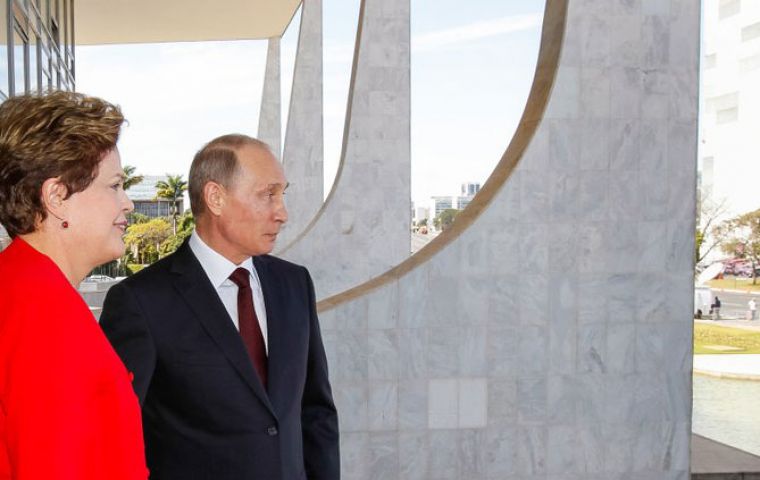MercoPress. South Atlantic News Agency
Putin and Rousseff discussed doubling bilateral trade ahead of BRICS summit
 The Russian president was received with full head of state honors by Rousseff at Planalto Palace in Brasilia
The Russian president was received with full head of state honors by Rousseff at Planalto Palace in Brasilia Brazilian president Dilma Rousseff and her Russian counterpart Vladimir Putin have restated their aim of doubling bilateral trade between the two nations to a value of 10 billion dollars a year, in a meeting held a day before the sixth summit of the BRICS group on Tuesday.
Rousseff received the Russian head of state in Brasilia Monday after both figures attended the World Cup final, which in 2018 will be held in Russia.
The meeting took place ahead of tomorrow's summit of the BRICS nations, composed of Brazil, Russia, India, China and South Africa, in the north-eastern city of Fortaleza. One of the central issues discussed by Rousseff and Putin was the trade objective of 10bn, agreed three years ago.
In 2013 the total reached just 5.56bn, a drop of 2% compared to the previous year, but both presidents affirmed that doubling the figure is a “realistic” objective and could be achieved medium-term, due above all to the size of both economies. With that goal in mind, Brazil and Russia signed an agreement designed to increase trade with the promotion of mutual investments.
The sixth annual meeting of the BRICS gathers the Economy Ministers and Central Bank Presidents of each participating nation. Argentine President Cristina Fernández will arrive on Tuesday to attend the BRICS head of States summit, invited by Russia’s Vladimir Putin.
The sixth summit will focus on social inclusion and sustainable development, according to a BRICS official press release. Cristina is expected to speak on Argentina’s battle against the so-called vulture funds over its sovereign debt, at a meeting between the leaders of BRICS and the Heads of State and Government of South America.
In Buenos Aires, earlier on Monday Argentine Cabinet Chief Jorge Capitanich pointed out that the BRICS summit is an opportunity to “reformulate international policies”.
The representatives of the major emerging economies will discuss the creation of the Contingent Reserve Arrangement (CRA), described as an “additional line of defense for BRICS countries in countries in scenarios of Balance of Payments' difficulties”, and the New Development Bank (NBD) that seek to finance infrastructure and development projects.
Both institutions are conceived as an alternative to Western control over global finances and to the International Monetary Fund (IMF) and the World Bank (WB), lead by the US and Europe
Cabinet Chief Jorge Capitanich reiterated the Argentine government’s willingness to join the group of emerging economies but said “it is not just a matter of Argentine will”.
Asked about the possibility of Argentina joining the bloc, Capitanich pointed out the country’s leadership, boosted by President Cristina Fernández and highlighted its strategic reserves as a key point for a future Argentine membership.
However, Capitanich admitted “it is not just a matter of Argentine will, but of the member countries”.




Top Comments
Disclaimer & comment rules-

-

-

Read all commentsWhat the hell can Argentina offer this group with all of its protectionist measures. I'm sure it ticks all the boxes in the corruption stakes however. Maybe they are just holding out until that little matter of the default is resolved and widespread asset seizures.
Jul 15th, 2014 - 07:47 am 0”In Buenos Aires, earlier on Monday Argentine Cabinet Chief Jorge Capitanich pointed out that the BRICS summit is an opportunity to “reformulate international policies”.
Jul 15th, 2014 - 11:51 am 0So we can all look forward to The Dark Country giving the BRIC's lessons on lying, thieving, crying and wailing: but getting nowhere.
HA, HA, HA.
The Bric bank if it ever takes off will be capitalized using the U$.
Jul 15th, 2014 - 12:13 pm 0I don't see how a bunch of THE MOST CORRUPT countries in the world think they will have a successful bank.
The whole reason this is happening is because they feel slighted that nobody wants them running the IMF.
What a waste of time and effort.
Commenting for this story is now closed.
If you have a Facebook account, become a fan and comment on our Facebook Page!